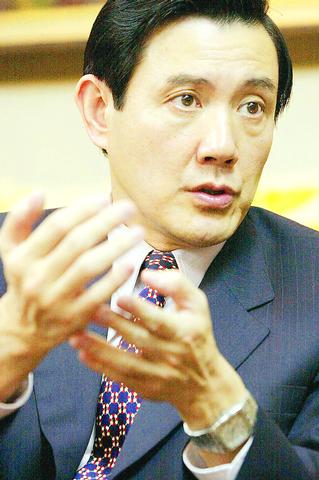Taipei City Mayor Ma Ying-jeou (
This marks Ma's second official visit to his birthplace since he took office in 1998.

TAIPEI TIMES FILE PHOTO
He has been invited by the Hong Kong Policy Research Institute (
He is scheduled to deliver a key note speech at a dinner celebrating the institute's fifth anniversary this evening.
His high-profile trip is expected to stir up media frenzy with a day full of interviews with local and international media including CNN, Star TV, Time magazine and the New York Times.
Media attention will also focus on his first meeting with the highest ranking official of the special administration region, Tung Chee-hwa (
Political observers have seen Ma's visit as China's attempt to befriend Taiwan's local governments and opposition parties to isolate President Chen Shui-bian (陳水扁).
Since Chen took office in May, Beijing has demanded he embrace the "one-China" principle but Chen has resisted.
As a rising star in Taiwan's KMT, Ma, the only KMT member to ever beat Chen in an election, seems the perfect candidate to compete against his old rival.
During his tenure as the deputy chairman of the Mainland Affairs Council (
Ma is accompanied by seven city government officials and seven city councilors.
City officials include Director of the Information Department, King Pu-tsung (
City councilors include Jeffrey Hsu (
They are expected to return to Taipei on Thursday.

AGING: As of last month, people aged 65 or older accounted for 20.06 percent of the total population and the number of couples who got married fell by 18,685 from 2024 Taiwan has surpassed South Korea as the country least willing to have children, with an annual crude birthrate of 4.62 per 1,000 people, Ministry of the Interior data showed yesterday. The nation was previously ranked the second-lowest country in terms of total fertility rate, or the average number of children a woman has in her lifetime. However, South Korea’s fertility rate began to recover from 2023, with total fertility rate rising from 0.72 and estimated to reach 0.82 to 0.85 by last year, and the crude birthrate projected at 6.7 per 1,000 people. Japan’s crude birthrate was projected to fall below six,

Conflict with Taiwan could leave China with “massive economic disruption, catastrophic military losses, significant social unrest, and devastating sanctions,” a US think tank said in a report released on Monday. The German Marshall Fund released a report titled If China Attacks Taiwan: The Consequences for China of “Minor Conflict” and “Major War” Scenarios. The report details the “massive” economic, military, social and international costs to China in the event of a minor conflict or major war with Taiwan, estimating that the Chinese People’s Liberation Army (PLA) could sustain losses of more than half of its active-duty ground forces, including 100,000 troops. Understanding Chinese

US President Donald Trump in an interview with the New York Times published on Thursday said that “it’s up to” Chinese President Xi Jinping (習近平) what China does on Taiwan, but that he would be “very unhappy” with a change in the “status quo.” “He [Xi] considers it to be a part of China, and that’s up to him what he’s going to be doing, but I’ve expressed to him that I would be very unhappy if he did that, and I don’t think he’ll do that. I hope he doesn’t do that,” Trump said. Trump made the comments in the context

SELF-DEFENSE: Tokyo has accelerated its spending goal and its defense minister said the nation needs to discuss whether it should develop nuclear-powered submarines China is ramping up objections to what it sees as Japan’s desire to acquire nuclear weapons, despite Tokyo’s longstanding renunciation of such arms, deepening another fissure in the two neighbors’ increasingly tense ties. In what appears to be a concerted effort, China’s foreign and defense ministries issued statements on Thursday condemning alleged remilitarism efforts by Tokyo. The remarks came as two of the country’s top think tanks jointly issued a 29-page report framing actions by “right-wing forces” in Japan as posing a “serious threat” to world peace. While that report did not define “right-wing forces,” the Chinese Ministry of Foreign Affairs was